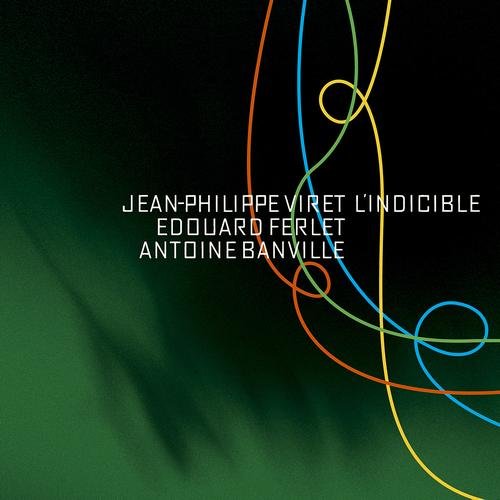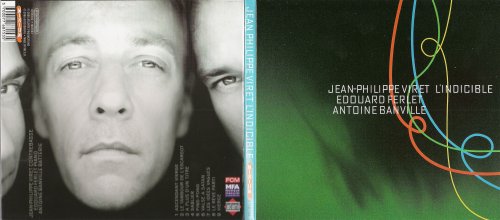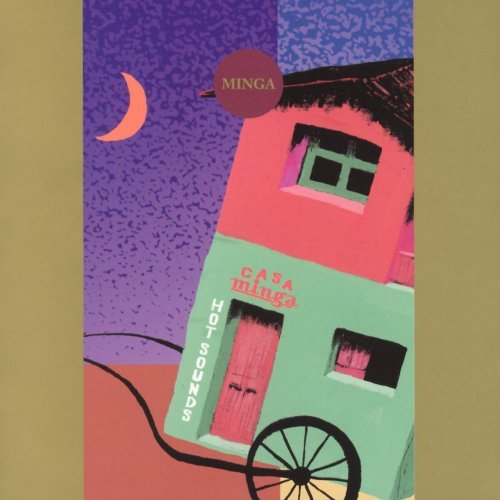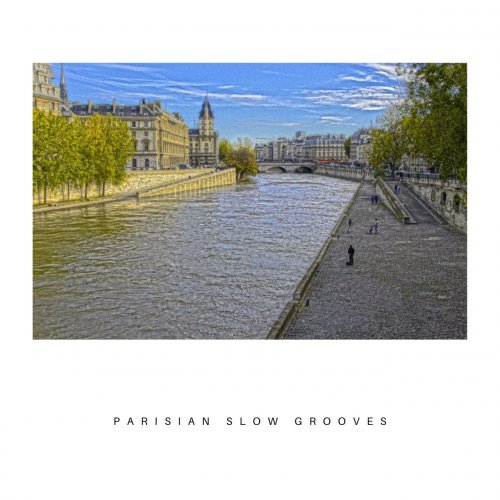Jean-Philippe Viret, Edouard Ferlet, Antoine Banville - L'Indicible (2006)

Artist: Jean-Philippe Viret, Edouard Ferlet, Antoine Banville
Title: L'Indicible
Year Of Release: 2006
Label: Discograph/Minium
Genre: Contemporary Jazz, Post-Bop
Quality: FLAC (tracks)
Total Time: 45:10
Total Size: 246 MB
WebSite: Album Preview
Tracklist:Title: L'Indicible
Year Of Release: 2006
Label: Discograph/Minium
Genre: Contemporary Jazz, Post-Bop
Quality: FLAC (tracks)
Total Time: 45:10
Total Size: 246 MB
WebSite: Album Preview
01. Ascendant vierge (Viret) - 2:19
02. Le Tambour de l'Escargot (Ferlet) - 6:41
03. A Plus d'un titre (Viret) - 5:32
04. Sablier (Viret) - 6:10
05. Ping-Pong (Ferlet) - 6:42
06. Valse a satan (Ferlet) - 5:44
07. Les idees vagues (Viret) - 4:38
08. Le reve parti (Viret) - 4:43
09. Vierge (Viret) - 2:41
Jean-Philippe Viret - bass
Edouard Ferlet - piano
Antoine Banville - drums
The excitement of an encounter between musicians who have never worked together can often make for unexpected magic. Still, there's much to be said for the evolving chemistry of longstanding collaborations. While French bassist Jean-Philippe Viret works extensively in Europe with artists like pianist Bill Carrothers and drummer Daniel Humair, his seven year-old trio with pianist Edouard Ferlet and drummer Antoine Banville evidences his true mettle. The group's two fine records for the now-defunct Sketch label—2000's Considérations and 2002's Étant Donnés—showed both promise and evolution, but with Sketch's demise, where to next?
The good news is that Sketch impresario Philippe Ghielmetti is back, producing records for a number of labels including Illusions Music, La Buissonne, and now Minium Music, which released Viret's latest, L'Indicible ("The Unspeakable"). Its indirect evocation of a broad range of emotions not only suits the title, but also strongly supports the philosophy of more permanent musical relationships.
The disc is bookended with two solo bass pieces featuring Viret's resonant arco—the rhythmic repetition of the opening "Ascendent Vierge referencing a minimalist sensibility, the closing "Vierge a more somber and elegiac piece—suggesting that Viret should consider a solo bass record. In many ways more classically-informed than jazz-centric, these solos share a certain modernistic approach with Italian bassist Stefano Scodanibbio, whose solo performance at last year's Festival International Victoriaville de Musique Actuelle was a clear highlight.
Ferlet is another artist who deserves greater attention. His solo recording Par Tous Les Temps (Sketch, 2004) demonstrated his ability to imply with the slightest turn of phrase, or hammer home an idea with overt expressionism. He's equally diverse here, often traversing considerable territory within the confines of a single tune. "Le Tambour de L'Escargot begins abstractly with Viret playing a pedal tone ostinato while Ferlet gradually builds towards a dark theme, ultimately resolving into a 5/4 section where he develops a dramatic solo that is at times lyric, at times more complex. Ferlet's left hand carries the difficult 7/4 rhythm on "A Plus D'un Titre, doubling the theme with Viret on his right, while Banville interacts actively and maintains forward motion.
If Viret has any precedent, it's Czech bassist Miroslav Vitous. Like Vitous, he respects his instrument's traditional timekeeping role, while at the same time acting as a vivid melodic counterpoint to Ferlet's often challenging motifs.
Ghielmetti defines Viret's trio as "not really a trio but rather a three musician orchestra, and it's as good a differentiation as any. While improvisation is a large part of what they do, in many ways their concerns are more ambitious—aimed at creating a sound that is both filled with space and larger than what one would expect from only three musicians. The depth of L'Indicible demonstrates the continued evolution of Viret's trio. A compelling alternative to swing-based jazz, this music draws its influences more from a classical aesthetic, but its openminded interplay remains equally valid as an example of jazz's broader potential.
The good news is that Sketch impresario Philippe Ghielmetti is back, producing records for a number of labels including Illusions Music, La Buissonne, and now Minium Music, which released Viret's latest, L'Indicible ("The Unspeakable"). Its indirect evocation of a broad range of emotions not only suits the title, but also strongly supports the philosophy of more permanent musical relationships.
The disc is bookended with two solo bass pieces featuring Viret's resonant arco—the rhythmic repetition of the opening "Ascendent Vierge referencing a minimalist sensibility, the closing "Vierge a more somber and elegiac piece—suggesting that Viret should consider a solo bass record. In many ways more classically-informed than jazz-centric, these solos share a certain modernistic approach with Italian bassist Stefano Scodanibbio, whose solo performance at last year's Festival International Victoriaville de Musique Actuelle was a clear highlight.
Ferlet is another artist who deserves greater attention. His solo recording Par Tous Les Temps (Sketch, 2004) demonstrated his ability to imply with the slightest turn of phrase, or hammer home an idea with overt expressionism. He's equally diverse here, often traversing considerable territory within the confines of a single tune. "Le Tambour de L'Escargot begins abstractly with Viret playing a pedal tone ostinato while Ferlet gradually builds towards a dark theme, ultimately resolving into a 5/4 section where he develops a dramatic solo that is at times lyric, at times more complex. Ferlet's left hand carries the difficult 7/4 rhythm on "A Plus D'un Titre, doubling the theme with Viret on his right, while Banville interacts actively and maintains forward motion.
If Viret has any precedent, it's Czech bassist Miroslav Vitous. Like Vitous, he respects his instrument's traditional timekeeping role, while at the same time acting as a vivid melodic counterpoint to Ferlet's often challenging motifs.
Ghielmetti defines Viret's trio as "not really a trio but rather a three musician orchestra, and it's as good a differentiation as any. While improvisation is a large part of what they do, in many ways their concerns are more ambitious—aimed at creating a sound that is both filled with space and larger than what one would expect from only three musicians. The depth of L'Indicible demonstrates the continued evolution of Viret's trio. A compelling alternative to swing-based jazz, this music draws its influences more from a classical aesthetic, but its openminded interplay remains equally valid as an example of jazz's broader potential.

![Seán Mac Erlaine, Caoimhín Ó Raghallaigh - Old Segotia (2025) [Hi-Res] Seán Mac Erlaine, Caoimhín Ó Raghallaigh - Old Segotia (2025) [Hi-Res]](https://img.israbox.com/img/2026-02/13/69rfun7bj67wruna9muyohy0g.jpg)

![Momoko Gill - Momoko (2026) [Hi-Res] Momoko Gill - Momoko (2026) [Hi-Res]](https://www.dibpic.com/uploads/posts/2026-02/1770838961_a3258795048_10.jpg)


![Alex Alicke - The recovered files (2026) [Hi-Res] Alex Alicke - The recovered files (2026) [Hi-Res]](https://www.dibpic.com/uploads/posts/2026-02/1771222991_cover.jpg)
![Shake Stew - TEN ONE TWO (2026) [Hi-Res] Shake Stew - TEN ONE TWO (2026) [Hi-Res]](https://www.dibpic.com/uploads/posts/2026-02/1770829622_wjfgdtvb962qa_600.jpg)
![Larry Nocella - Everything Happens To Me (Remastered) (2026) [Hi-Res] Larry Nocella - Everything Happens To Me (Remastered) (2026) [Hi-Res]](https://www.dibpic.com/uploads/posts/2026-02/1770910166_cover.jpg)
